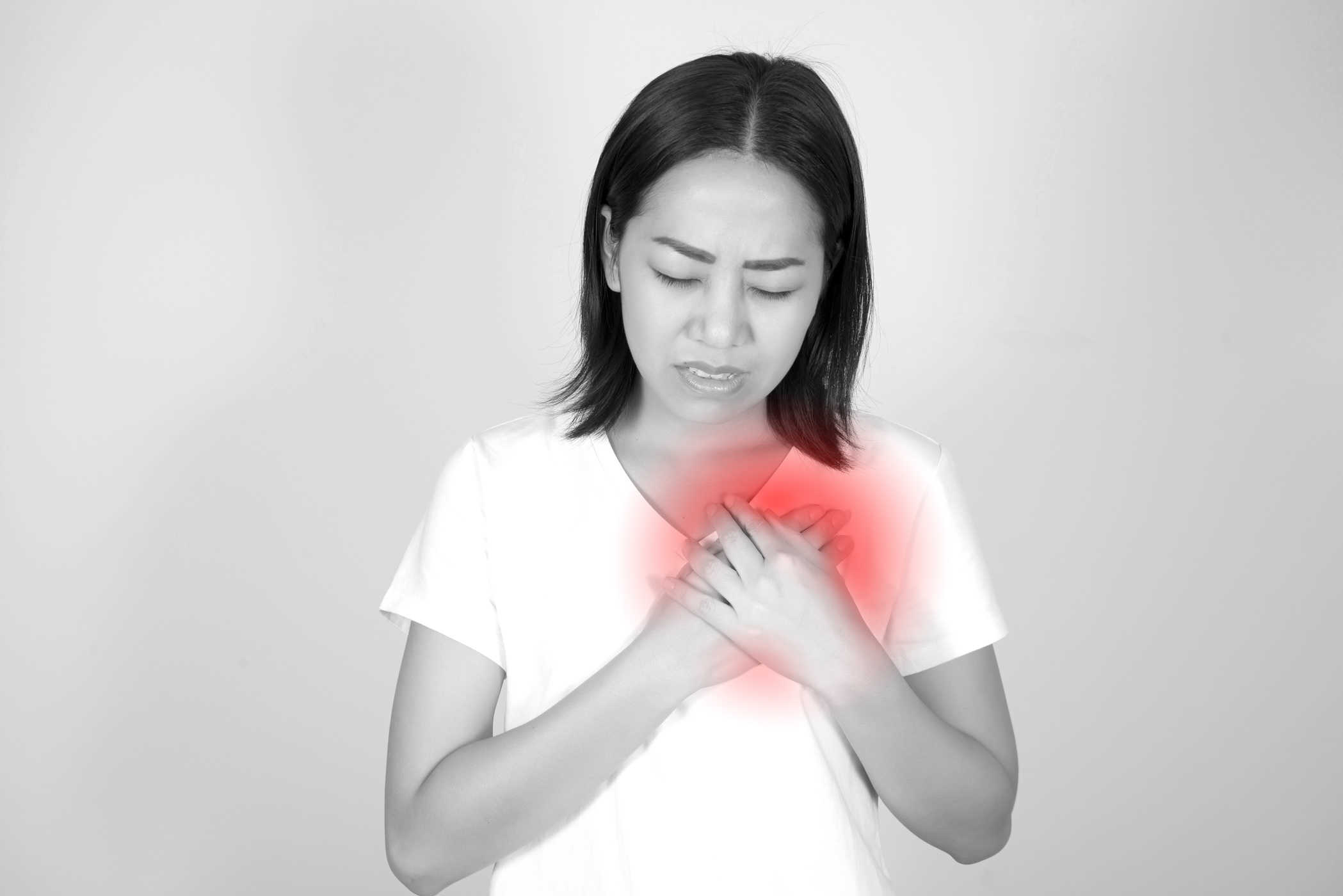Contents:
- Medical Video: 5 Common Signs of Heart Disease
- Overview of heart disease
- Symptoms of heart disease
- 1. Symptoms of heart disease due to coronary heart disease
- 2. Symptoms of heart disease due to arrhythmias
- 3. Symptoms of heart disease due to congenital heart defects
- 4. Symptoms of heart disease due to heart infection (endocarditis)
- 5. Symptoms of heart disease due to heart valve disease
- Factors can increase the risk of getting this disease
- Test for diagnosing this disease
- Various treatment options for this disease
- What you can do to prevent this disease
- 1. Diligent sports
- 2. Pay attention to food intake
- 3. Avoid stress
- 4. Stop smoking
- 5. Routinely check blood pressure and cholesterol
- 6. Limit alcohol
- 7. Take medication for heart disease regularly
Medical Video: 5 Common Signs of Heart Disease
Heart disease is one of the leading causes of death in the world. In Indonesia itself based on Riskesdas 2013 data, the types of heart and blood vessel disease that occur a lot are coronary heart disease (CHD).
This disease is often called "Silent killer" (noiseless killers) because in many cases a person is unaware of having this disease until they show signs of a heart attack or heart failure. Therefore, it is very important for you to notice the symptoms of heart disease early. This disease can sometimes be detected early with a routine examination.
Overview of heart disease
Heart disease is all diseases that occur as a result of impaired heart function. Coronary heart disease (CHD) is the most common type of heart disease. This condition is a result of the buildup of plaque in the coronary arteries, which blocks blood flow to the heart and increases the risk of heart attack and other complications.
Usually coronary heart disease caused by accumulation of cholesterol so that it forms plaques on the arterial wall for a considerable period of time. Over time this condition will cause a blocked blood flow and this disorder is known as atherosclerosis. Over time, coronary heart disease can cause the heart muscle to weaken, and cause complications such as heart failure and arrhythmias (heart rhythm disorders).
Meanwhile, other types of this disease include:
- Irregular heartbeat (arrhythmia)
- Congenital heart defects
- Weak heart muscle (cardiomyopathy)
- Heart valve problems
- Heart infection
Symptoms of heart disease
Basically the symptoms of this disease will vary depending on the type of heart disease you are experiencing. Please note that the characteristics of heart disease may also be different for men and women. For example, men are more likely to experience chest pain. While in addition to experiencing chest pain, women also tend to have other symptoms such as shortness of breath, nausea, and often feel chronic fatigue.
The following are the most common symptoms of heart disease based on the type of heart disease you have:
1. Symptoms of heart disease due to coronary heart disease
Coronary heart disease (CHD) occurs due to a blockage in the arteries caused by plaque buildup. As a result, blood flow is not smooth. Coronary heart disease causes the heart muscles not to function properly in carrying out their duties to pump blood throughout the body. So, when the heart muscle stops pumping, complications will arise, namely heart attack or even heart failure.
Coronary heart disease is the most common type of heart disorder. Some typical symptoms of coronary heart disease include:
- Pain in the chest (angina
- Cold sweat appears
- Nausea
- Hard to breathe
2. Symptoms of heart disease due to arrhythmias
Arrhythmia is a heart disorder characterized by abnormal beats or rhythms, where your heart rate can be too fast, too slow, too early or irregular.
Characteristics of heart disease due to arrhythmia include:
- Heart palpitations
- Heart rate sooner or later
- Dizzy
- Chest pain
- Hard to breathe
- Sweating
- Fainting (syncope) or almost fainting
- Palpitations (heartbeat like missed, pounding)
3. Symptoms of heart disease due to congenital heart defects
Congenital heart abnormalities or congenital heart defects are conditions of an imperfect heart structure. Characteristics of this type of heart disease include:
- Skin discoloration, such as bluish or pale color (cyanosis)
- Swelling of the legs and abdomen
- Easily tired or short of breath shortly after physical activity
These problems will generally inhibit the activity of congenital heart patients, and can appear at varying ages and can also persist into adulthood.
4. Symptoms of heart disease due to heart infection (endocarditis)
Endocarditis is an infection that affects the inner membrane that separates the chamber and the heart valve (endocardium). This condition is rare and requires intensive care. People who have congenital heart disease and have a history of other heart problems have a high risk of experiencing this condition.
Characteristics of this type of heart disease include:
- Fever
- Hard to breathe
- Fatigue
- Swelling in the legs or abdomen
- Irregular heartbeat
- Dry cough continuously
- A skin rash or unusual reddish or purplish spots appear
5. Symptoms of heart disease due to heart valve disease
The heart has four valves, namely the aortic, mitral, pulmonary and tricuspid valves. The valve functions to open and close the blood flow directly through your heart. The valves can also be damaged due to various causes, such as narrowing (stenosis), leakage (regurgitation or insufficiency), or incomplete closure (prolapse).
Actually, the characteristics of this type of heart disease will depend on which valve has a disorder. Even so, in general the characteristics of this type of heart disease generally include:
- Chest pain
- Fatigue
- Hard to breathe
- Irregular heartbeat
- Swollen feet or ankles
- Fainting (syncope)
There may be some characteristics of heart disease that are not mentioned above. However, in general sIf you have a characteristic of heart disease, it's important to be aware of the characteristics of early heart disease, especially if you have a family history of this disease.
Factors can increase the risk of getting this disease
Here are some factors that can increase your chances of getting this disease including:
- Age. Aging increases the risk of damaged or narrowed arteries, and the heart muscle is weakened or thickened.
- Sex. Men are at higher risk of developing this disease. However, the risk of women getting this disease also tends to increase after menopause.
- Family history. If your father or mother has this disease, your risk of developing the same disease will also increase. Especially if your parents have this disease at an early age (before age 55).
- Smoke. Nicotine and carbon monoxide contained in cigarettes are blood vessel enemies, which in turn can increase the risk of cardiovascular disease.
- Certain chemotherapy and radiation therapy drugs. Some chemotherapy drugs and radiation therapy can increase the risk of cardiovascular disease.
- Bad diet. A diet that is high in fat, grams, sugar, and cholesterol will increase your risk of developing this disease later on.
- High blood pressure. Uncontrolled high blood pressure can cause hardening or thickening of the arteries and constrict your arteries.
- High cholesterol. High cholesterol levels in your blood can increase the risk of plaque formation and atherosclerosis.
- Obesity. Obesity is a cause of various chronic diseases, including cardiovascular disease.
- Diabetes. Diabetes can increase the risk of cardiovascular disease as well as hypertension and obesity.
- Lazy sports. The lack of physical activity is also associated with various types of cardiosvacular disease and several other risk factors as well.
- Stressful. Uncontrolled stress can damage your arteries and increase your risk of this disease.
- Not keeping clean. Forgetting handwashing habits and not maintaining overall hygiene increases viral and bacterial infections that can affect the heart.
Test for diagnosing this disease
There are various types of tests that will be used to diagnose this disease. Your doctor will choose certain tests based on your symptoms and summary of your family history. In addition to blood tests and chest X-rays, other tests that doctors usually use to diagnose this disease include:
- Electrocardiogram (ECG).This test is done to help identify heart rhythm problems.
- Echocardiogram. This test is carried out using ultrasonic waves to see blood flow through the heart.
- CT Scan.This test is done using X-rays which create a crossing heart appearance.
- Heart MRI. This test is carried out using magnets and high-level radio waves to create images of the heart and surrounding tissue.
- Stress test.This test is done to monitor the heart during periods of strenuous activity or exercise
Various treatment options for this disease
Treatment for heart disease depends on the condition, but includes changes in lifestyle and taking medication for heart disease.
Lifestyle changes include:
- Eat healthy foods and are rich in fiber, omega 3 fatty acids, fruits, and vegetables. Choose foods that are low in fat, sodium, and cholesterol to help control blood pressure.
- Increase physical activity to maintain a healthy body weight, reduce the risk of diabetes, and maintain cholesterol levels. Do it for at least 60 minutes every week.
- Quitting smoking can reduce the risk of heart disease and complications.
- Drinking moderate amounts of alcohol can reduce blood pressure and reduce the risk of heart disease. Men must drink no more than two glasses, and women no more than one glass of alcoholic drinks per day.
- Learn how to deal with stress, either through exercise, medication, stress management therapy or group support.
When lifestyle changes don't help improve your condition, your doctor will prescribe heart disease medication to reduce the risk of heart attack or stroke.
Medication for heart disease is prescribed by a doctor based on the condition and severity of the patient. But in general, this heart disease drug aims to lower blood pressure or prevent blood clots. There are many types of heart disease drugs. However, there are several heart disease medications that doctors often prescribe.
For example, heparin heart disease drugs are used to prevent complications after a heart attack; high blood pressure medications, such as ACE inhibitors, diuretics, Angiotensin II receptor blockers (ARB), beta blockers, aldosterone, and inotropics; until aspirin and statins reduce cholesterol.
Sometimes, medical procedures are needed to treat some of these diseases. An example is angioplasty (a flexible tube inserted into the artery to increase blood flow) or coronary artery bypass surgery (surgery performed by transferring blood vessels in an area to another area to increase blood flow to the heart).
What you can do to prevent this disease
Cardiovascular disease is a chronic disease. Even so, it does not mean you cannot prevent this disease. In many cases, this disease is caused due to the application of an unhealthy lifestyle. Therefore, a powerful way to prevent this disease is to adopt a healthy lifestyle. Here are some things you can do:
1. Diligent sports
Exercise can help improve heart fitness, reduce cholesterol and blood pressure, to maintain a healthy body weight. That is why, try to exercise at least 30-45 minutes a day. Do whatever type of exercise you like, because all sports are basically good. In essence, do everything that makes you active.
2. Pay attention to food intake
Avoid or limit foods that can increase your blood cholesterol, such as fatty meats, sausages and burger meat, butter, cream, to cakes, biscuits, chocolate, and sweets. In essence, limit the salt, fat, and sugar you eat. Expand to eat fibrous foods from fruits, vegetables, wheat, and nuts.
Because the food's high levels of fiber can reduce your cholesterol and blood pressure. Not only that, fibrous foods also help you manage a healthy weight.
3. Avoid stress
Chronic stress can lead to a heart attack if it is not managed properly. Well, to prevent cardiovascular disease triggered by stress, you must be smart in managing emotions. If your stress is felt excessive, confide in someone, both the closest person and a professional counselor. You can also try meditation, yoga, or deep breathing techniques to relieve the stress you experience.
4. Stop smoking
If you are a smoker, you should start trying to quit smoking. Smoking can increase blood pressure and damage blood vessels. Therefore, quitting smoking and / or avoiding exposure to cigarette smoke can help prevent this disease.
5. Routinely check blood pressure and cholesterol
Routinely checking blood pressure and cholesterol every day can prevent cardiovascular disease. In general, blood pressure is normal when showing numbersbelow 120/80 mmHg. When your systolic number (top number) is between 120-139, or if the diastolic number (bottom number) ranges from 80-89, this means you have "prehypertension".
While for good total cholesterol levels in the blood is less than 200 mg / dl. Usually your cholesterol is considered high when it reaches 240 mg / dl or more.
6. Limit alcohol
Avoid consuming large amounts of alcohol. For women, limit your alcohol intake to no more than one glass a day. While for men, limit your alcohol intake to no more than two glasses a day.
7. Take medication for heart disease regularly
Sometimes, lifestyle changes alone are not enough to prevent this disease. You may need to take medication for heart disease which includes blood pressure or cholesterol-lowering drugs to reduce the risk of heart attack. If your doctor has given you heart disease medication that you should take, you must obey by drinking it regularly according to your doctor's instructions.















